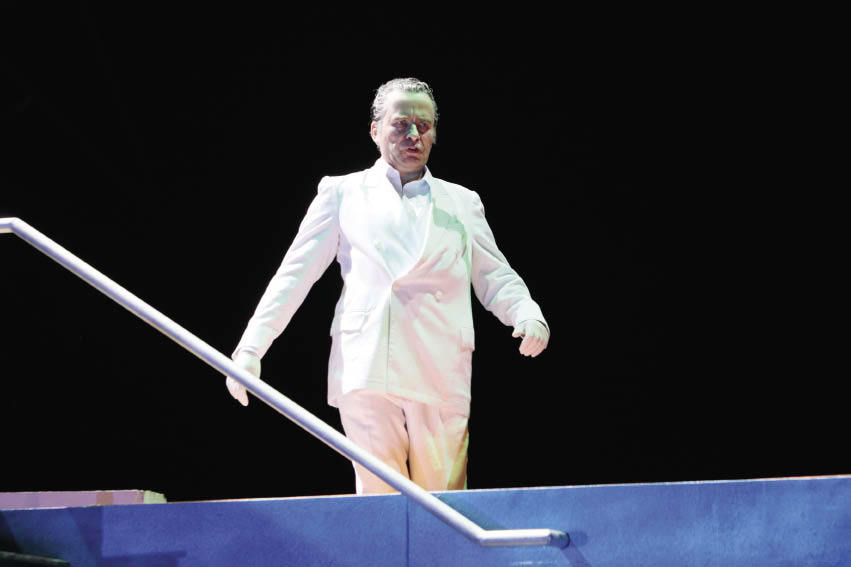Don Giovanni is an opera which gives plenty of scope for alternative interpretations, as has been very clearly demonstrated in the past 30 or so years, since directors took over as the determining force in productions. But there are certain basic features which any production, to be taken seriously, must respect. The two most obvious are that the Don must be a figure of riveting allure, and that social position is a key factor in the development of the action, at any rate until that gets dispersed in the ill-organised Act II. Once these are in place, there is plenty of room for dealing with such matters as how appealing, as well as alluring, the Don should be; whether it’s just bad luck or dramatist’s judgment that he doesn’t manage actually to seduce anyone during the course of the opera; and so on.
The social issue means that it is difficult to give the work a near-contemporary setting, since neither Don Giovanni’s relationship with his servant Leporello and their peculiar species of interdependence nor his dealings with the peasants Zerlina and Masetto make sense in the present day. The only recourse, if you are bent on updating, is to have a translation that eliminates many elements in the original, and amounts virtually to a new piece.
That is what Jeremy Sams has obliged with: ever more ‘creative’ in his translations, he has now run wild and deserted the sense of Da Ponte’s brilliant libretto to the extent that he must take a considerable part of the blame for the abysmal total result. Sams purveys an all-purpose jokiness which he transports from one opera to another, and which makes every character seem flip, ‘cool’, a member of the contemporary pop-cultural scene at its most depressing.
That is most evident in Iain Paterson’s portrayal of the Don. He takes off his trousers during the Overture, and in the opening scene, dressed in the statutory black boxer briefs, inserts himself through Anna’s window, emerging wearing a female wig and a knee-length turquoise jacket, vaguely 18th century, and nothing else. Mostly, though, he is dressed in a rust-coloured suit and looks like a professional laugher from a TV show, with no charisma or sexual dynamism whatever. That could be the end of the review, but I’d better say a bit more.
The sets, pushed round tirelessly by an assortment of yobs wearing Jesus T-shirts and Halloween masks, are of tacky late-20th-century lounges, with plastic sofas. Masetto and his pals let off heart-shaped balloons to add to the merriment. From time to time we hear amplified heavy breathing from the dead Commendatore. Overall, there is no sense of narrative, that the plot is going anywhere — which is dangerous in an opera where, for much of Act II, it isn’t.
Musically, the two great opening chords, so much and rightly celebrated as among the most terrifying sounds in music, are synchronised with two dazzling, loud fire crackers exploding on the stage. One is instantly aware of how much Mozart’s miraculous score is going to be respected. Kirill Karabits conducts an odd account, which might improve in the run; but on the first evening the tempi, when they weren’t manically fast, were of a staidness that consorted oddly with the small, or small-sounding orchestra and the incessant vulgar vitality of what we saw onstage.
Given the context, most of the acting had some conviction, even if no relevance to this opera. As Anna, the gifted Katherine Broderick produced some lovely sounds, but too many raucous shrieks. The Elvira was a last-minute replacement. Sarah Redgwick’s was the most satisfactory performance of the evening, though she had little chance to explore Elvira’s comic-poignant vengeful devotion to the Don. The Zerlina, Sarah Tynan, had to sing her intimate Act I aria to the whole crew, not just to Masetto, a rather plausible interpretation by John Molloy.
Brindley Sherratt’s Leporello is a mere down-and-out, whose catalogue has been transformed into a monthly scoresheet, provoking howls of laughter. Paterson sang the Don accurately, though with no joie, and ‘La ci darem’ was the dullest I’ve ever heard. Matthew Best’s Commendatore imparted as much dignity as he could under the circumstances. All we need now is a Commendatore to drag down to hell Don Giovannis as appalling as this one.
As enterprising as ever, the Guildhall School of Music and Drama mounted Almeida’s Spinalba, an opera which was only discovered in 1969, and only previously heard in the UK in 1979. It is a piece with many charming arias, contemporaneous with Handel but more reminiscent of Alessandro Scarlatti. Most of the jokes in this production came from Stephen Medcalf’s setting it in an old folks’ home, with Zimmer frames, and interruptions to watch their favourite TV shows. That seemed unnecessary, and made a long evening even longer. There is charm in this music, and the performance was well up to GSMD’s high standards, but I have had a surfeit of almost-forgotten 18th-century operas, and could do with several years’ respite.






Comments